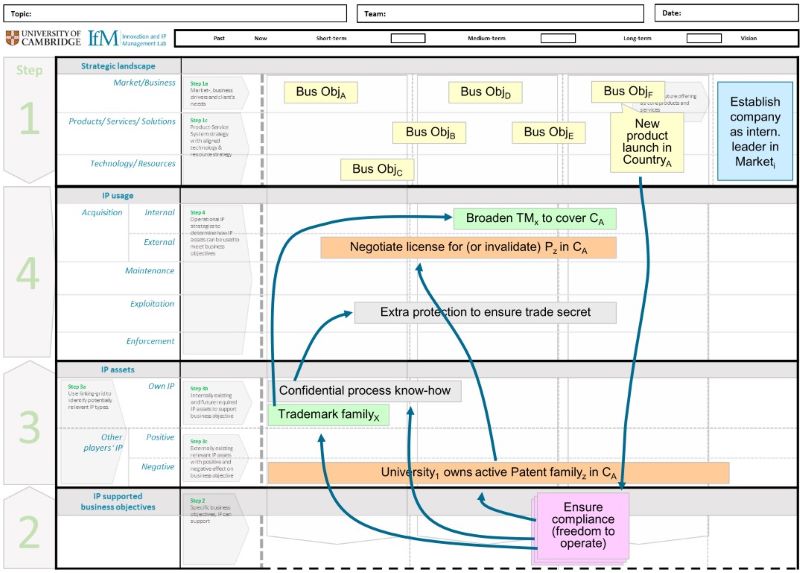In today’s innovation-driven economy, intellectual property (IP) has evolved from a legal safeguard to a core strategic asset. Yet, many firms still struggle to develop coherent IP strategies that are aligned with their business objectives. This gap—between operational IP management and strategic decision-making—is the motivation behind a stream of research led by our Lab at the Institute for Manufacturing, University of Cambridge. Over the past several years, we have developed and validated a novel approach that uses roadmapping as a structured, participatory tool to formulate business-aligned IP strategies.
From Legal Asset to Strategic Resource
The growing proportion of firm value attributable to intangible assets has shifted the centre of gravity in corporate strategy. However, IP is still often managed in a fragmented, reactive manner, with limited integration into broader business strategy (Tietze et al., 2022). We argue that this disconnect can be addressed through roadmapping—a method well established in technology and innovation management, but underutilised in the IP domain.
Introducing IP Strategy Roadmapping
Our foundational work (Wang et al., 2017; 2018; Tietze et al., 2022) developed a five-step IP roadmapping process with associated visual templates that guides organisations through:
-
Strategic landscape exploration
-
Identification of IP-relevant business objectives
-
Mapping existing and needed IP assets
-
Formulating operational IP strategies for each asset
-
Developing a time-bound strategic IP narrative
This process, delivered through structured workshops and supported by visual templates, fosters cross-functional alignment and improves strategic clarity. Unlike traditional legal-led approaches, our method enables firms to position IP as an enabler of value creation, not merely a defensive mechanism.
Practical Validation Through Industry Collaboration
Our approach has been applied in real-world settings, including a strategic IP workshop with Tribosonics, a scale-up transitioning from consultancy to a data-driven service provider. The workshop, facilitated by IfM Education and Consultancy Services, demonstrated how the five-step process enables SMEs to prioritise IP investments, link IP assets to business milestones, and align stakeholders across technical, legal, and commercial domains (Tribosonics Case Study, 2020).
Furthermore, the IP roadmapping approach has been validated with a number of other firms, but also used extensively in teaching, such as executive programmes (e.g. NTNU Master of Technology Management) and university teaching (e.g. as part of the Innovation & Strategic Management of Intellectual Property module delivered annually to engineering undergraduate and graduate students).
Tailoring IP Roadmapping to Different Use Cases
Over the year, we have developed - and continue to doing so - the generic IP roadmapping process further for specific use cases, with particular interest in how this visual tool can be used to help organisations with low internal IP management knowledge and capabilities:
IP Strategies for Service-Intense Business Models
A major contribution of our work lies in addressing the often-neglected challenge of IP strategy in service-intense business models. In product-service systems (PSS), where value stems from both tangible goods and intangible services, conventional IP strategies fall short. Blümel, Tietze, and Phaal (2022) extended the original framework to develop a roadmapping-based approach tailored to the unique dynamics of PSS. The methodology explicitly considers the IP needs of three PSS components—product, service, and infrastructure—and integrates informal IP (e.g. trade secrets, contracts) alongside formal rights.
This approach was developed and validated through an in-depth case study with a UK-based high-tech SME and builds on earlier thesis work by Blümel (2020). The resulting method provides a structured process and template to guide service-oriented firms in identifying, protecting, and leveraging their IP in alignment with business goals.
IP Roadmapping for High-Growth Ventures
Building on these foundations, Fritz (2023) adapted the IP roadmapping tool for investor-backed, high-growth technology ventures. These ventures face distinct challenges: capital constraints, milestone-based funding, and a dynamic competitive environment. The resulting artefact—developed through three iterative workshop cycles—integrates time-sensitive planning into IP strategy formulation, helping ventures align IP decisions with funding and scaling objectives.
A Research-Based Contribution to Practice
Collectively, this body demonstrates how roadmapping can be used as a practical and theoretically grounded tool for developing IP strategies across firms in different settings. Across various contexts—from manufacturing SMEs to tech start-ups and service-centric firms—the method has demonstrated its versatility, clarity, and alignment with real-world decision-making processes.
By reframing IP strategy development as a cross-functional, visual, and iterative process, our roadmapping approach empowers firms to use IP not just to protect assets, but to actively shape their innovation trajectories.
If you are interested in learning more about how roadmapping can help your organisation to systematically reflect on the use of IP in your organisation and develop a forward looking IP strategy, please contact Graham Bell (gb633@cam.ac.uk), who is one of the IfM Engage third party associates with a wealth of experience and expertise with IP roadmapping.
References
Wang, T., Tietze, F., Phaal, R., & Athanassopoulou, N. (2017). Roadmapping for Strategic Management of Intellectual Property. R&D Management Conference, Leuven.
Wang, T., Tietze, F., & Phaal, R. (2018). Intellectual property strategy development through roadmapping. R&D Management Conference, Milan.
Wang, T., 2020. Roadmapping for Intellectual Property Strategy Formulation: a Conceptual Framework and a Practical Process. PhD Thesis, University of Cambridge.
Tietze, F., Phaal, R., Blümel, J., & Wang, T. (2022). Roadmapping for formulating IP Strategies. CTM Working Paper Series, University of Cambridge, Cambridge, UK.
Blümel, J.H., Tietze, F., & Phaal, R. (2022). Formulating IP strategies for service-intense business models: A roadmapping-based approach. World Patent Information, 70, 102132.
Blümel, J.H. (2020). Intellectual Property for Service-intense Business Models. MPhil thesis, University of Cambridge.Fritz, J. (2023). A design science research approach to a milestone-based IP management tool for investor-backed, high-growth new technology ventures. MPhil thesis, University of Cambridge.
IfM ECS (2020). Developing a technology company’s IP strategy that provides maximum support for its business model – Tribosonics Case Study.

